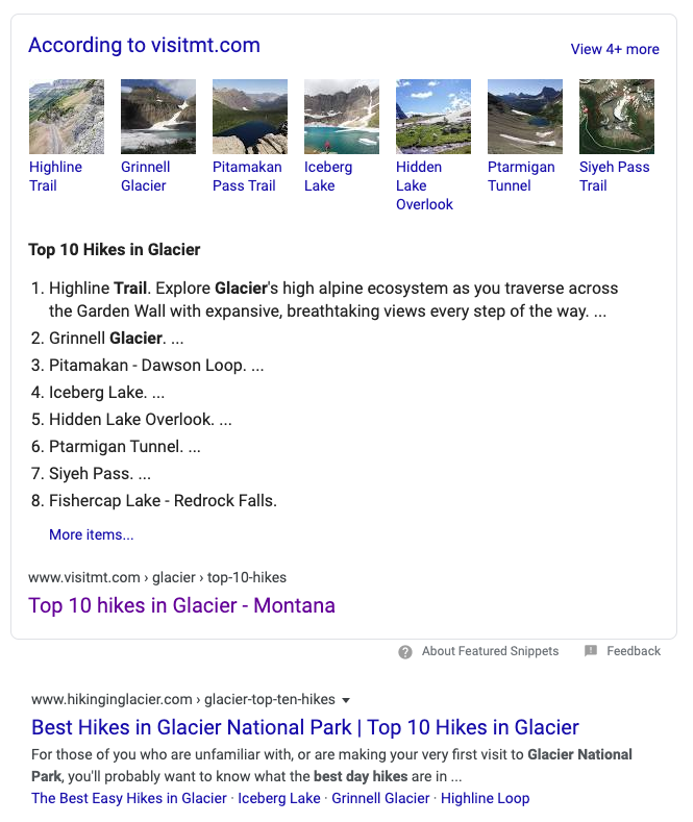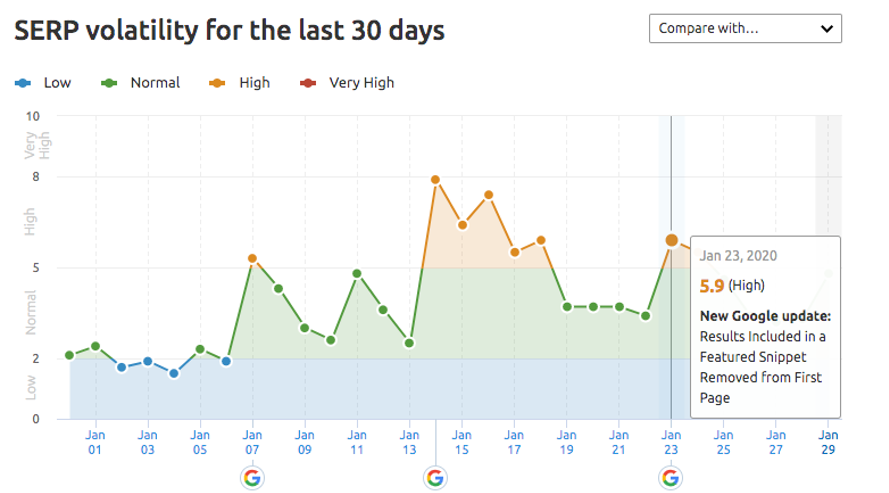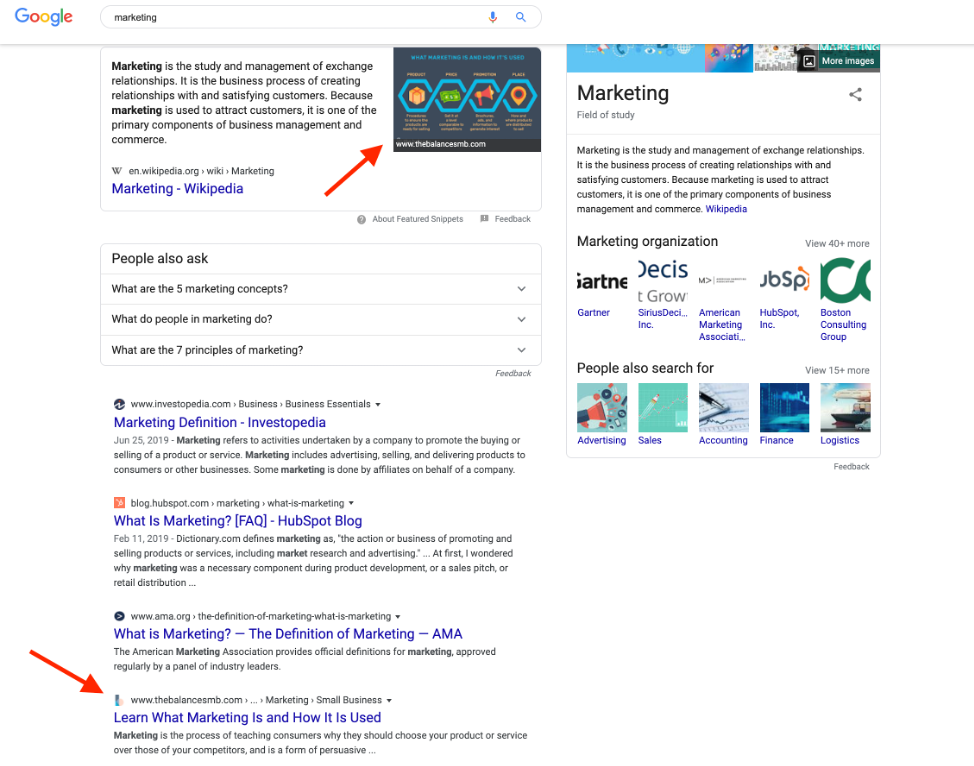Google Has Deduplicated Featured Snippet Results: Here’s What You Should Know
If you’ve recently logged in to Google Analytics to be surprised you’ve had a dip in organic traffic, the reason might be out of your control.

Marketers often say they want to be first in Google Search results. However, for some queries, there is a position better than first — featured snippets, often referred to as position 0.
Viewed as a special block above the organic search results, these featured snippets reverse the order of a search listing, placing the page’s description before the link. That description may take the form of a paragraph, a list or a table.
In the example below, visitmt.com has the featured snippet. Up until Jan. 22, 2020, it’s likely they would have been in position 1, now held by hikinginglacier.com.

As you can imagine, holding both positions gave sites two attempts to attract users, which was an incredible advantage.
On January 22, 2020, Google’s Danny Sullivan announced in a tweet that web page listings appearing in the featured snippet position will no longer be repeated again in the search results below. This is an update that was rolled out globally and will affect anyone who has featured snippets.
When the announcement was released, our digital team was left with more questions than answers. Fortunately, Google has been somewhat quick to provide additional info. Here’s what we’ve been asking — and what we’ve wrapped our heads around so far, with help from various industry experts.
When a listing is deduplicated from the first page, what happens to it?
Early evidence suggests that it is moving to the second page of results. However — and this is crucial — Sullivan has stated that the top of page two “is not a guaranteed position, nor by design, nor might it stay that way. Deduplication does not purposefully move the deduplicated URL to the second page.”
How will Google Search Console change in response to this update?
No updates to Google Search Console will take place. Per the Google SearchLiaison Twitter account: “Featured snippets were already counted, duplicate appearances were not.”
What happens if I ever lose my featured snippet?
This will return to the web results, and it’s very likely it will appear on the first page.
Does this take place at the URL or domain level?
This hasn’t been explicitly answered, but a tweet from Google notes that “deduplication also only happens at the exact URL in the featured snippet and only within the first page of results.”
Should I expect this to interact with my paid search efforts in any way?
There’s no clear answer, but when we asked Jacob Havenridge, senior marketing manager at LinkedIn for his opinion, he suggested that it shouldn’t have a major impact on paid efforts. He noted that it could “slightly increase ad traffic for first page paid listings, but likely by a negligible margin, if at all.”
Surprisingly, his advice was to keep an eye on your ads below page one, pointing out that “the larger effects will probably be felt by advertisers who have carved out a niche on the second page, as the addition of URLs for organic featured snippets onto that page may siphon some paid traffic.”
How should I expect this to impact my organic traffic?
Frankly, we don’t have a lot to go off of, so it’s a bit difficult to say what the precise impact will be. In the short term, one thing is clear: You should expect to see a drop in traffic if you had featured snippets. This is backed by data provided by Elizaveta Shutova, marketing manager at SEMrush, who told us that “data from the SEMrush Sensor tool indicates that high SERP volatility was registered.”

“One of the main negative consequences of this update is related to the right sidebar featured snippets,” she says. “As users tend to click on the main search results page, it makes this type of featured snippets almost invisible.”
Is this really best for users? What about marketers?
In asking several SEO experts for their opinions, we found that there was a more positive response to the update than we might expect.
“While most marketers like to press every advantage they can, the integrity of Google’s results page is what gives us our massive platform with which to reach our audience,” says Ken Malfi, senior digital marketing manager at Townsend Security. “So, what is good for the user, ultimately, is good for marketers.” In short, while initial impact is a hit to organic traffic, the long-term impact is that it provides a better user experience, which is ultimately good for everyone.
Gaetano Nino DiNardi, director of demand generation at Nextiva, echoed this sentiment. “You won’t get to ‘double dip’ with position 0 and 1 combined, but it’s still better to own the snippet than to not have it,” he says. “Those searchers who actually click through to your content are the ones who have a greater level of interest …. In a way, this weeds out the site visitors you don’t want by design.”
What steps should marketers take in light of this update?
One effort that all marketers should take is to account for this in their reporting. If you start to see a dip in your traffic, work to trace it back to specific pages of your site. This should help to explain any unexpected traffic losses to key stakeholders.
By tracking URL level data in Google Search Console, you may find that you earned more traffic from having position one than position 0, which is a bit counterintuitive. In these cases, you may want to take steps to avoid the featured snippet — words we never thought we’d say—so that you can return to position one.
Dan Quirk, head of marketing of scaleMatters, has identified an opportunity to continue (pseudo) double-dipping. He shared the example below, pointing out that thebalancesmb.com has a featured image at the top in the featured snippet, and that the article that contains that featured image appears ranked No. 5 in web search results.

“Creating engaging graphics — and properly naming the image file name and alt text — has always been a best practice for SEO,” he explained, “but I’ll be putting even more emphasis on it as a tactic for earning that featured image position and garnering brand awareness.”
What does this tell us about featured snippets and rich snippets more generally?
Jesse Daniel Amos, marketing manager at New Horizons Learning Group, says that the focus on losing position one was too shortsighted, and this update is reflective of broader changes in search. He recommends doubling down on featured snippets, people also ask and other units outside of the typical search listings. “Google doesn’t display search results anymore — it answers questions,” he says. “Forget about page two or three. If you’re not the featured snippet, you’re not getting seen.”
Matthew Berger, SEO specialist at WebPT, is in agreement, suggesting that “marketers need to focus on winning these featured snippets by answering the questions people are searching for …. Google has established that they will reward the sites that are utilizing these and page rankings should correspond with these efforts.”
Doubling down on these efforts makes sense. Over the years, Google has progressively added more units outside of the normal search listings. This has resulted in an increasing number of zero-click searches.
The point is clear: If you’re worried about losing position 1, your focus is in the wrong place.
What should I do moving forward?
As noted above, it will be important to track the impact of this update in the coming months. Beyond that, it would be wise for marketers to place an even greater emphasis on earning any of the rich snippets available moving forward.
We’d also advise marketers evaluate the importance of their various featured snippets — and how they should respond to this update — from a business perspective. If you were previously double-dipping on a search query, were earning 1,000 clicks a month and have now lost position 1 and only get 550 clicks a month, this would indicate that the first position was contributing 450 clicks.
If two months down the road you lose the featured snippet and return to position 1, is it worth fighting to regain the featured snippet so that you can earn an extra 100 clicks a month? It’s unlikely — but will depend on the value of that traffic to your business.
In the coming months, you may find that you’ve lost traffic, but before doing anything you should ask: How important was that traffic to my business?
